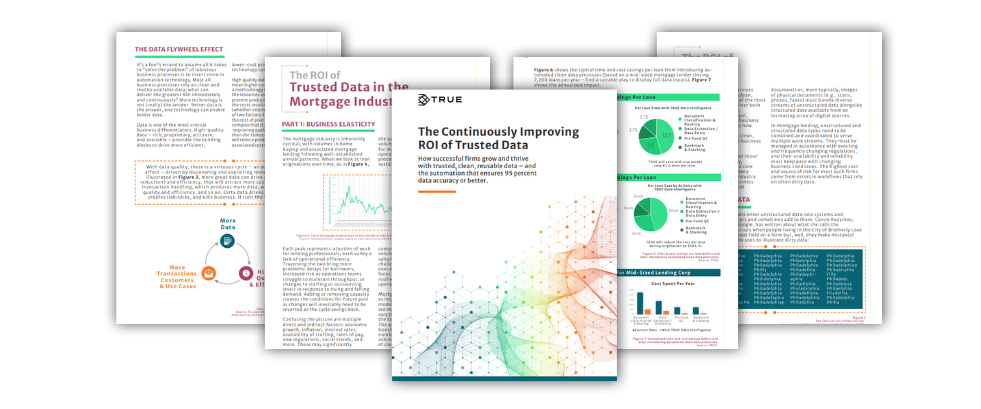How AI Brings Trust to Loan Portfolios
Blog post originally posted on the TRUE blog post
Imagine an alternate reality where trust does not exist…
In this world, everyone requires documented evidence for any assertion, any claimed fact. The administrative toil it would take to overcome relentless suspicion and doubt sounds like a dystopia fit for a movie!
If you work in the mortgage industry, this fictitious scenario might not sound so far removed from your daily reality. Lending decisions are based on information presented by borrowers, but borrower data cannot simply be trusted as fact. And so ensues a process of gathering and reviewing documentary evidence, the results of which are checked and rechecked in a complex and costly process of continual quality control (QC).
Here’s how Garth Graham, Senior Partner at mortgage industry advisory firm STRATMOR Group, characterizes the situation.
This reality is no longer one that our industry must endure. In TRUE’s version of this movie – and this really is a true story – ingenuity intervenes to save the day.
TRUE customers throughout the lending industry, from originators to funders, are integrating artificial intelligence (AI) into QC processes. Their reality is one where the toil of processing borrower documents is removed, automated verification virtually eliminates doubt about borrower data, and assessments of risk are much lower as loans are traded to the secondary market.
AI in the Post-Closing Process
Lenders using TRUE, industry proven AI that captures and verifies trusted borrower data, will typically use this technology at the start of loan manufacturing. The TRUE AI platform automates document-to-data classification and extraction tasks with levels of accuracy and completeness that greatly exceed the performance of unaided humans.
However, the most important phase of QC is arguably the post-closing process. This is a lender’s last chance to ensure the accuracy, completeness and integrity of the data that supports its loan decision. Applied here, TRUE’s AI brings a high level of automation to most post-closing QC tasks. This includes:
- A complete audit of the accuracy and correctness of the loan application
- The presence, correct versioning, execution (signatures) and accuracy of all underwriting documents, including re-verifying them if necessary while ensuring data integrity
- A check of the underwriter’s decision which supported the loan application
- Verification of the appraisal, property eligibility, project eligibility, and the mortgage insurance documentation
By integrating AI, lenders can be confident that every loan in their portfolio has been audited to the highest possible standards of accuracy and completeness before the portfolio is offered to permanent funders and servicers.
Passing Investors’ Test of Trust
Any mortgage sold in the secondary market must meet requirements set by investors, such as underwriting criteria, documentation standards, etc. Investors sample a small percentage of loans within a portfolio to identify those which fall below their standards.
For lenders, these tests are a major point of risk. Defects in the data, and a lack of supporting documentation, can be extremely costly. There may be individual loan buybacks, demands for additional testing of a broader sample, or rejection of an entire portfolio if too many loans are assessed as substandard.
The AI in the TRUE Platform reviews individual loans in minutes, which means 100 percent QC can be performed across entire mortgage portfolios in a matter of hours. This capability is offered in a product, TRUE Data Verification. It helps to ensure every loan meets the specific criteria set by the purchasing investor, with interrogation down to the level of individual documents.
When both lender and investor apply TRUE to the trading of loans, this test of trust becomes highly automated, fast and efficient. It means zero or very few defects, faster turnarounds allowing warehouse funding to be paid sooner, and ultimately improves lenders’ quality ratings which lowers the costs of funding over the long-term.
Servicing Transfer
Lenders and loan quality are also key factors for mortgage servicers when bidding for portfolios. Accurate and complete loan data is paramount when loans are transferred to a different entity for ongoing servicing, and this is where AI can play another role in creating trust.
By reviewing loans with the support of TRUE Data Verification, lenders can be certain that they’ve provided a complete package of data and documents. Servicers can use the same technology and processes to assess loans on the way in, with greater confidence in risk scoring allowing more aggressive bidding.
Convenience and Compliance
Two further post-closing challenges that are eased by TRUE are document retrieval and auditing for regulatory compliance.
The TRUE Platform makes it easy to for lenders to apply document retention policies that ensure regulatory compliance and minimize long-term storage costs. As TRUE processes each document, it creates a permanent association between data points and their source documents. This allows anyone from loan officers to auditors to quicky retrieve and interrogate any information, including for queries that arise during post-closing QC.
Data reviews can also be aligned with rules contained in regulations such as the Truth in Lending Act (TILA), Real Estate Settlement Procedures Act (RESPA), and relevant state and federal consumer protection laws. This helps lenders audit all loans for compliance and provides a document trail that can be provided to external assessors.
An Ending Based on Truth
A world where there is assurance of facts is one where trust flows easily. TRUE is helping both lenders and secondary market entities change the plot of the lending story to one that always has the happing ending of proven data, lower risk and easier trading of loans.
It may not have the drama of movie dystopia, but it’s a state of affairs that the mortgage has long sought and, thanks to AI, can now achieve.




